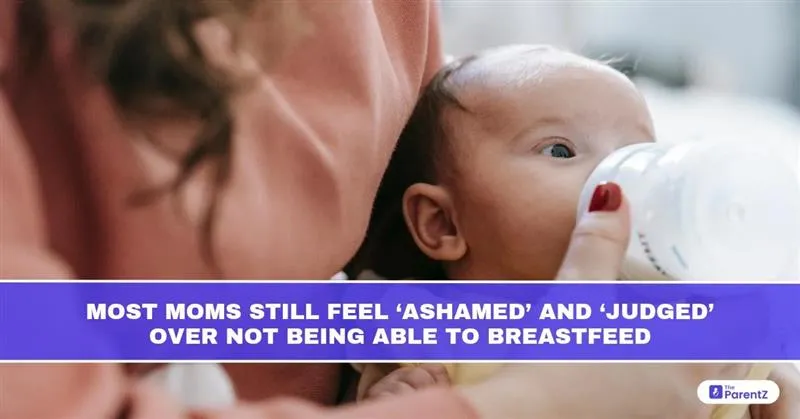Breastfeeding is widely promoted as the gold standard of infant nutrition. Rightly so, breast milk provides ideal nutrition, immunological protection, and bonding benefits. However, in clinical reality, not all mothers are able to breastfeed, and when they can’t, many are left feeling ashamed, judged, or like they’ve failed as mothers.
Recent surveys in both the UK and India have shown that a majority of mothers who resort to partial or full formula feeding report feeling guilty, defensive, or unsupported, even when their decision is based on medical necessity. This article unpacks the complex factors behind these emotions and urges for a more compassionate, evidence-based approach to infant feeding support.
The Social Pressure to Breastfeed
Governments and healthcare bodies promote breastfeeding through campaigns like WHO’s Baby-Friendly Hospital Initiative and NHS Start4Life. While these efforts are crucial for improving breastfeeding rates, they often fail to include empathy for those who struggle to nurse.
Common reasons why mothers feel judged:
- Needing to supplement with formula
- Early cessation due to low milk supply
- Medical conditions like PCOS, thyroid disorders, or past breast surgeries
- Baby’s issues like tongue-tie, prematurity, or poor latch
- Returning to work without maternity leave flexibility
- Postpartum depression or trauma
The problem isn’t the promotion of breastfeeding but how the lack of nuance in public messaging leads to moral judgment and maternal shame.
What the Data Says: It’s Not a “Choice” for Everyone
A 2023 UK-wide maternal health survey found that:
- Over 67% of mothers who used formula did so after trying unsuccessfully to breastfeed
- 73% said they felt guilty or “less of a mother” when they couldn’t continue
- 59% reported receiving no emotional support from health professionals after stopping breastfeeding
In India, data is even more complex due to stigma, cultural expectations, and a lack of lactation support in rural areas. Many mothers are pressured to persist with exclusive breastfeeding even when their physical or emotional health is deteriorating.
This shows that the conversation must move beyond “breast is best” to “fed is essential, supported is ideal.”
The Psychological Impact of Breastfeeding Struggles
Breastfeeding difficulties, especially when paired with a lack of support, are a well-known trigger for:
- Postpartum depression
- Anxiety and sleep deprivation
- Feelings of failure, guilt, and low self-worth
- Disconnection from the baby
- Marital strain or isolation
A study in BMC Pregnancy and Childbirth reported that women who were unable to meet their breastfeeding goals were twice as likely to develop depressive symptoms by 8 weeks postpartum.
Instead of compassion, many mothers face dismissive responses like:
“Try harder.”
“Every mother can breastfeed if she wants to.”
“You’re taking the easy way out.”
These attitudes can deepen emotional scars that last far beyond infancy.
Medical Reasons Why Some Women Can’t Breastfeed
Breastfeeding isn’t always biologically possible. Genuine medical conditions include:
- Insufficient glandular tissue (IGT)
- Retained placental fragments delaying milk production
- Thyroid disorders, anemia, or diabetes
- Medications incompatible with breastfeeding (e.g. chemotherapy, SSRIs in certain cases)
- Infectious diseases like HIV (in certain regions)
- Postpartum haemorrhage leading to hormonal disruption
The NHS, ACOG, and IAP all acknowledge that while breastfeeding is ideal, safe, and nutritionally adequate, formula feeding is a valid medical alternative.
The Formula Stigma: What Needs to Change
Mothers who use formula by need or by choice often report:
- Hiding formula bottles in public
- Pretending to breastfeed when they aren’t
- Feeling alienated in mothers’ groups
- Avoiding postnatal check-ups to dodge judgment
This stigma is driven by a narrow, idealised image of motherhood that ignores medical realities and emotional needs. Feeding a baby should not come with shame.
What Should Healthcare Providers Do Differently?
To truly support mothers, healthcare systems and professionals must:
- Normalize all feeding journeys. Include realistic options in antenatal classes; talk about formula, pumping, combination feeding.
- Offer early, judgment-free lactation support. Catch issues early; refer to certified lactation consultants. Don’t be ashamed when things don’t work.
- Screen for postpartum mental health issues, especially when mothers express breastfeeding distress or sudden cessation.
- Use neutral, inclusive language Avoid phrases like “failing to breastfeed” or “did not try hard enough.”
- Follow WHO’s updated stance on mother-centered care. Recognize informed choice, even when it differs from policy ideals.
Reframing the Narrative: Fed, Loved, and Supported
Here’s the truth:
- A well-fed, emotionally supported baby thrives whether on breastmilk, formula, or a mix.
- A mother’s mental and physical health is not less important than feeding ideals.
- Breastfeeding is beautiful but so is watching a baby grow through any safe, loving nourishment.
When society stops glorifying one version of motherhood, more women can feel empowered, not ashamed, in their decisions.
Conclusion
Most mothers deeply want to breastfeed. When it doesn’t work out, the emotional cost is made worse by silence, shame, and systemic failure to support them. It’s time we stop asking “Did you breastfeed?” and start asking:
“Were you supported, informed, and cared for no matter how you fed your baby?”
Changing this culture means reshaping not just public health messaging, but the very way we define maternal success.
References
- NHS – Your Guide to Bottle Feeding
- BMC Pregnancy and Childbirth, 2022 – Maternal Guilt and Infant Feeding Outcomes
- WHO Infant and Young Child Feeding Guidelines
- Royal College of Midwives – Supporting Women Who Formula Feed
- UNICEF UK – Baby-Friendly Care That Respects Women’s Choices
- ACOG Committee Opinion: Breastfeeding and the Use of Human Milk





Be the first one to comment on this story.